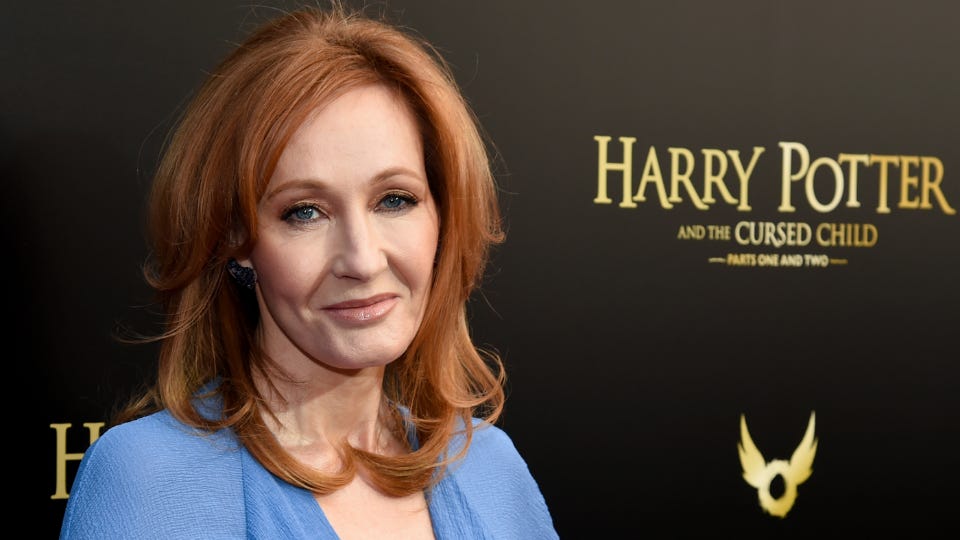I apologize for being a couple of days late, but I am working on several projects. I was almost ready with this post yesterday, but it didn’t seem fitting to post a tribute to someone on April Fool’s day, so it’s a couple of days later than I had planned. Enjoy.
“It is our choices…that show what we truly are, far more than our abilities.” – J.K. Rowling
When J.K. Rowling chose to write, she didn’t necessarily do it to pursue fame and fortune. Her ability to write is obvious to many now that her books have been published. She chose to share her passion by sending manuscripts to publishers. Not long after, her writing would amuse millions of readers around the world.
J.K. Rowling said, "I just write what I wanted to write. I write what amuses me. It's totally for myself. I never in my wildest dreams expected this popularity." Rowling is the literary hero of an entire generation. Her Harry Potter books brought a world of magic and imagination to life in the minds of millions, and still do to this day![1]
Joanne Rowling was born on 31, July 1965 at Yate General Hospital near Bristol, and grew up in Gloucestershire in England and in Chepstow, Gwent, in south-east Wales.[2] Her childhood was generally happy, although she does remember getting teased because of her name, “Rowling.” She recalls often getting called “Rowling pin” by her less than ingenious school friends.
From an early age, Rowling had the ambition to be a writer. She often tried her hand at writing, although little came from her early efforts. Aged six she wrote a book about a rabbit with measles.[3] After she received praise from her mother for her earliest work, J.K. commented that they should get it published.
Joanne (Jo) studied at Exeter University, where she read so widely outside her French and Classics syllabus that she clocked up a fine of £50 for overdue books at the University library. Her knowledge of Classics would one day come in handy for creating the spells in the Harry Potter series, some of which are based on Latin.[4]
After earning her degree, she moved to London and worked in a series of jobs, including one as a researcher at Amnesty International. “There in my little office I read hastily scribbled letters smuggled out of totalitarian regimes by men and women who were risking imprisonment to inform the outside world of what was happening to them.”
She said later. “My small participation in that process was one of the most humbling and inspiring experiences of my life.”[5] Amnesty International, is one of the many charities, which Rowling has generously supported since she attained a new-found wealth.[6] She also contributes money to the research and treatment of Multiple Sclerosis.
Jo conceived the idea of Harry Potter in 1990 while sitting on a delayed train from Manchester to London King’s Cross. Over the next five years, she began to map out all seven books of the series. She wrote mostly in longhand and gradually built up a mass of notes, many of which were scribbled on odd scraps of paper.[7]
Taking her notes with her, she moved to northern Portugal to teach English as a foreign language, married Jorge Arantes in 1992 and had a daughter, Jessica, in 1993. When the marriage ended later that year, she returned to the UK to live in Edinburgh, with Jessica and a suitcase containing the first three chapters of Harry Potter and the Philosopher’s Stone.[8]
Rumors have circulated that Rowling was homeless for some time. However, according to Jo, “she was as poor as you could get in modern Britain.” After her “catastrophic” marriage, she said, “It hit me what a complete mess I had made of my life. We were as skint as you can be, without being homeless, in other words we were existing entirely on benefits. And at that point I was definitely clinically depressed.”[9]
Her clinical depression went so far as the consideration of suicide in those early days. Fortunately, Rowling turned to writing in order to finish the Harry Potter books. She felt that, at this point, she had nothing to lose, even if she was rejected by every publisher in the United Kingdom. And, it has become well known now that the dementors (evil soul sucking creatures) are inspired by depression itself.[10]
In Dec 1993, Rowling returned to the UK, moving to Edinburgh where she tried to finish her first book. She was surviving on state benefits and bringing up her daughter as a single parent. She would often go to Edinburgh cafes to work on the book whilst her child had a nap.[11]
Harry Potter and the Philosopher’s Stone was first published by Bloomsbury Children’s Books in June 1997, under the name J.K. Rowling. The “K” stands for Kathleen, her paternal grandmother’s name.
Her publisher thought a book by an obviously female author might not appeal to the target audience of young boys.[12] As a result, the first ever fan letter she received - from a young girl named Francesca Grey - began "Dear Sir..." Admittedly, I, myself, fell for this publishing ploy, as well.
Rowling says of her writing process, that she imagines she walks through a forest towards a lake. At the lake, she waits for an inspiration to emerge from its depth. Then she takes this back to her cottage where she has to polish the dream-like inspiration until it is in a fit state to publish.[13]
This process has been working for her pretty well so far. In 2017, according to Forbes, her estimated wealth stands at $650 million, it would be higher but she has donated substantial sums to charity. The global Harry Potter brand is estimated to be worth £7 billion.[14]
Rowling created her characters largely out of people she knows or have met. In fact, the character, Hermione, was based on herself. “Hermione is a bit like me when I was 11, though much cleverer.”[15] Even though Hermione was created, based on herself, Jo shares a birthday with Harry Potter.
In this day of hurt feelings for every spoken or written word, even the great J.K. Rowling is not immune. Much ado has been made of J. K. Rowling’s essay explaining her “reasons for speaking out on sex and gender issues.” She has been accused of transphobia far and wide.[16]
Even sanctimonious younger cast members of the Harry Potter movie series (actors of mediocre talent who would not be where they are were it not for Rowling) have tweeted out woke platitudes.
In her essay, Rowling provides “five reasons” for being “worried about the new trans activism, and deciding I need to speak up.” The first is her philanthropic activity, which “supports projects for female prisoners and for survivors of domestic and sexual abuse” as well as funding medical research into MS, “a disease that behaves very differently in men and women.”
The second is that she is an ex-teacher and head of a children’s charity, with an interest in education and safeguarding children. The third is that, as a “much-banned author,” she is interested in freedom of speech. The fourth is a concern “about the huge explosion in young women wishing to transition,” especially since she herself was once unhappy with her body.
And the fifth reason is that, as a domestic- and sexual-abuse survivor, she stands in “solidarity with the huge numbers of women who have histories like mine, who’ve been slurred as bigots for having concerns around single-sex spaces.”[17] Her essay said nothing directly against any trans-person, people, or movement.
In her essay, Rowling mentions Magdalen Berns, a lesbian feminist based in Scotland who sadly died last year, and who co-founded the grassroots movement For Women Scotland, which fights to hold the Scottish government accountable for relentlessly attempting to erode women’s sex-based rights and protections.
A spokesperson for the organization said their work is often “exhausting and demoralizing” and cited the draft “Hate Crimes bill” introduced in April which “could see women imprisoned for speaking biological truths if someone claims to find it offensive.”[18] No kidding. Apparently, if you say a man is a man, to a man who identifies as a woman, and that man is offended, you could go to jail.
In true Rowling fashion, she remained resilient and strong, weathering the criticism and holding true to her values. She has plenty to lose, but she maintained her composure and did not back down, or cave, to the pressures of the woke. For all of her achievements, success, commitment, strength, and pride, this tribute is for the great J.K. Rowling, this Women’s History Month.
[1] https://www.readersdigest.co.uk/culture/books/meet-the-author/5-things-you-didnt-know-about-jk-rowling
[2] https://www.jkrowling.com/about/
[3] https://www.biographyonline.net/writers/j_k_rowling.html
[4] https://www.jkrowling.com/about/
[5] https://www.jkrowling.com/about/
[6] https://www.biographyonline.net/writers/j_k_rowling.html
[7] https://www.jkrowling.com/about/
[8] https://www.jkrowling.com/about/
[9] https://www.stylist.co.uk/books/20-unknown-facts-about-j-k-rowling-harry-potter/127501
[10] https://www.readersdigest.co.uk/culture/books/meet-the-author/5-things-you-didnt-know-about-jk-rowling
[11] https://www.biographyonline.net/writers/j_k_rowling.html
[12] https://www.jkrowling.com/about/
[13] https://www.biographyonline.net/writers/j_k_rowling.html
[14] https://www.biographyonline.net/writers/j_k_rowling.html
[15] https://www.stylist.co.uk/books/20-unknown-facts-about-j-k-rowling-harry-potter/127501
[16] https://www.nationalreview.com/2020/06/j-k-rowling-vs-woke-supremacy/
[17] https://www.nationalreview.com/2020/06/j-k-rowling-vs-woke-supremacy/
[18] https://www.nationalreview.com/2020/06/j-k-rowling-vs-woke-supremacy/



